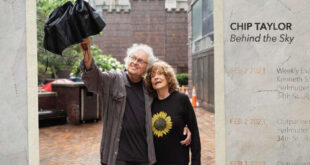The Taiwan Philharmonic’s concert at Lincoln Center on Friday night was a festive affair. Conductor Jun Märkl brought sweeping majesty to Debussy’s La Mer and Mendelssohn’s Hebrides Overture. Violinist Paul Huang dazzled with Max Bruch’s Scottish Fantasy for Violin and Orchestra. And the concert opened with a spectacular new piece by Taiwanese composer Ke-Chia Chen titled Ebb and Flow, written for the orchestra’s current tour.
Sometimes you can tell when musicians are really delighted to be where they are. There was that sense of excitement on the stage at David Geffen Hall, matching the enthusiasm bubbling in the audience. Musicians crowded the stage wall-to-wall, and you could feel positive energy emanating from them as individuals as well as collectively. The program’s theme was islands and oceans, but the feeling was homey, like a huge family reunion.
Hear the Ocean Roar
In Ebbs and Flow Chen took a descriptive approach to depicting the soundtrack of the ocean. Brashly mining the tension of a recurring flatted-fifth interval, the piece sets forth with a faint drumbeat, then layers of scurrying sounds and rising squeaks. A tuba suggests the heft of something whale-sized; then an even bigger force approaches, a crashing storm.
A foghorn emerges through a gust of shivering dissonances. A rapid whirl ensues, driven by the timpani, as the massed orchestra creates a whipping wall of sound. What struck me amid this controlled chaos was the composer’s mastery of the orchestra’s many different voices – what each can suggest, and how to make them meld and clash with artful purpose.
Those tense flatted fifths asserted themselves again during a more explicitly rhythmic march, which faded – the tide going out – to the gentle tolling of a gong, perhaps a hopeful signal of the piece’s worthiness to be inscribed in the rarefied canon of powerful and accessible contemporary orchestral music.
Harpist Shannon Shuen Chieh, featured in the previous week’s chamber music concert, was positioned front and center for the orchestra’s muscular performance of Bruch’s Scottish Fantasy. The harp has, in effect, second billing to the violin soloist.
The piece has been a popular showcase for violinists since its premiere in 1881; many great soloists have performed and recorded it.

Paul Huang brought an ideal sweet, silvery tone to the Prelude. He proceeded to display a remarkably strong double-stop and chordal technique. Even in the quicker, higher passages his sound cut distinctly through the orchestra. The Andante was especially affirming, affecting – really just beautiful.
In the Finale, Huang maintained a graceful touch even at maximum attack, with wondrous fluidity on the rapid runs, chromatic and otherwise, fingers flying almost too fast to see. After an ovation he returned with Corigliano’s Red Violin Caprices as a solo encore.
Island-Hopping and Seafaring with Mendelssohn and Debussy
After the intermission, a sturdy and pungent accounting of Mendelssohn’s Hebrides Overture continued the island-ocean theme. Maestro Märkl drew near-perfection from the orchestra, with on-target unison and finely wrought dynamics. Debussy’s trio of “symphonic sketches” La Mer then took us off-island and back to the open ocean.
I thought back to the descriptive Ebbs and Flows as Märkl led the orchestra through Debussy’s impressionistic evocation of the wind and the waves and the passage of time. The wandering paths of the composer’s imagination played out luxuriously. The second sketch, “Jeux de vagues” (“The Play of the Waves”), felt like an energized spinning-out of a mysterious tale or journey. “Dialogue du vent et de la mer” (“Dialogue of the Wind and the Sea”) effectively conveyed the ocean’s restlessness.
The oceans are restless indeed these days. But that shouldn’t stop us from crossing them. As Rick Steves says, “Travel is rich with learning opportunities, and the ultimate souvenir is a broader perspective.” As an encore, the Taiwan Philharmonic (known at home as the National Symphony Orchestra) played Hsiao Tyzen’s romantic ballad “The Angel from Formosa.” (Formosa is an old name for Taiwan.) A direct, heartfelt request to “please come!” and visit the island met with appreciative laughter.
Knowing Taiwan has such a superb orchestra could be yet another reason for Westerners, whose own musical traditions the Taiwan Philharmonic promotes and sustains so ably, to consider paying a visit to Taiwan. The New York Philharmonic, which made this concert possible, is planning to do just that: make a reciprocal visit to Taiwan during its Asia tour this summer.
 Blogcritics The critical lens on today's culture & entertainment
Blogcritics The critical lens on today's culture & entertainment




